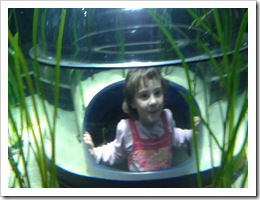How do you find time to help your children develop a lifelong love of learning?
It was half-term recently. Rosemary had a great week, fitting in an overnight stay with her Granny (my mum), a visit of a few days from her Grandma (Chris’ mum), a daytrip to Bristol to visit their aquarium, a morning swimming with her dad, Grandma and sister, an afternoon at the local Sure Start Centre (where she used to go regularly and where Eleanor goes weekly, and where my sister works), a morning at Go Bananas (soft-play centre), an afternoon swimming lesson, a trip to the cinema and her usual weekend of ballet on Saturday and swimming on Sunday. Not a huge amount of relaxing, though Friday did include some time in front of the TV watching a couple of films. I also got her the first couple of Usborne Very First Reading books and we read some every night, and got her a lot more confident and happy with her reading, seemingly (though her enthusiasm has waned again, since being back at school). And there was lots of playing and reading and drawing and talking in there, too.
What we’ve noticed since being back at school is that there’s very little time to fit things in. To fit in a leisurely chat about fish and and sea horses and octopuses eating crabs, to chat about the bedtime reading (Harry Potter and the Chamber of Secrets at the moment), to visit a museum or an art gallery, to investigate the properties of baking soda, to paint a cup or a piggy bank or make a peg doll. Rosemary gets home at about 3.45, we eat at 5.30 and after that it’s the bedtime routine – bath, reading with me, 20-minute TV show (on DVD) with Chris, reading with Chris, sleep. That’s less than two hours on days when there’s nothing else after school (she has a class or activity two days a week and there’s usually at least one playdate a week, often two) and most of that time she wants to play with her sister or on her own. Of course. In the morning, she’s up between 7 and 7.30 and we leave around 8.40. We have to fit in breakfast, getting dressed, some reading or writing and a bit of playing, if at all possible.
There’s not too much homework in reception, but that’s not going to last forever. And what there is, it’s difficult to find the right time (i.e. when she’s not too tired and is receptive) – reading, playing with letters and sounds. We try to tell her more about things she’s learning at school, or take the opportunity to talk about things she notices or asks about or sees in books, but there’s really not time to go into any kind of depth. Sometimes she laps up what we’re saying and other times she glazes over and just gets to the point where she stops listening and starts chattering away.
On Monday morning, she spent over an hour creating a poster about her trip to Bristol Aquarium. She made an octopus and a shark and cut out some photos from the trip to stick on an A3 piece of paper. The whole time she was doing it, she was talking to me about the trip and things she’d seen or learnt (talking about seeing the octopus being fed a crab, it changing colour, how daddy seahorses carry the babies, how archer fish spit out of the water at insects to stun them so they can eat them, and so on and so on). She was looking for to telling her teachers and friends about it all, too. Sadly, she took the poster up to school in her book bag and somehow it disappeared without anyone looking at it. (They had moved classroom over half-term, so it was very chaotic.) After a few days of searching for it, it was clear that it was gone for good, so I printed out the photo I’d taken of it (phew!) and she took that up with her. She says she talked about it with three of her teachers, but I don’t think, by that point, she had the enthusiasm she’d had for it at the start of the week. But… aside from the whole losing a piece of work she’d spent a long time over (which is an issue in itself), they don’t have the time at school to spend an hour sitting with her while she talks about something and explores her discoveries.
So can she get that love of learning from school? For example, her enthusiasm for and capabilities in reading seem to be very different between here and school (she reads much better and more happily here, especially if it’s not a ‘boring’ school book). Her teacher tells us that she is very enthusiastic and interested in learning at school, so maybe there’s nothing to worry about, but I think we’d both like to have more time to explore her interest and enthusiasm in things. She frequently doesn’t tell us what she’s been doing at school (yes, I know that’s pretty common) and even lies about it (telling us she didn’t do any reading, when her reading book has a clear note of a reading session, for example). She’ll get more homework as she gets older, but she’ll also have more after-school and weekend activities (presumably), so is there ever going to be time or will we be limited to holiday trips to places like Bristol Aquarium?
Now and then we both wonder a bit about home education. I was home educated for a few years, so it’s not something completely alien to us. We work from home, so are ideally placed for it – though we do obviously need to find time to actually work as well (my mum worked from home while teaching me, though, so that’s not such a big issue). After the enthusiasm with which she took to the aquarium over half-term and the success I felt I had with moving her reading forward a bit, it’s something that was seeming a bit more appealing. And, of course, there were the first few days back after the holidays when she turned into the devil child – screaming and stomping and refusing to do anything she was asked and so on. But, after a week back at school and being more back to normal, with a weekend when we both had plenty of time to chat with her about various things, it seems perhaps less of a problem. Maybe all we need to do is find the right way to discuss things, use weekends more wisely and perhaps get her up at 3am instead of 7am.
Do you have similar problems with finding time for everything? Do you try to do learning outside the school of some kind or are you happy to leave that to the school? Are you happy that there’s plenty of learning happening through play and no need to fit any more in? Do you think your children seem more receptive to the learning they do at school or at home? Or are you perhaps a home-educator and happy with the balance that you’ve created yourselves?





Leave a Reply